Importance of Financial Reporting Standards
VerifiedAdded on 2023/06/10
|5
|1231
|171
AI Summary
This article discusses the importance of financial reporting standards in maintaining transparency and safeguarding the interests of stakeholders. It also highlights the ethical dilemma faced by the financial controller of a company when the financial vice president rejects the proposal of early implementation of standards. The article concludes that the decision of not implementing the financial reporting standards will hurt the stakeholders’ interest of the company who are its integral part.
Contribute Materials
Your contribution can guide someone’s learning journey. Share your
documents today.
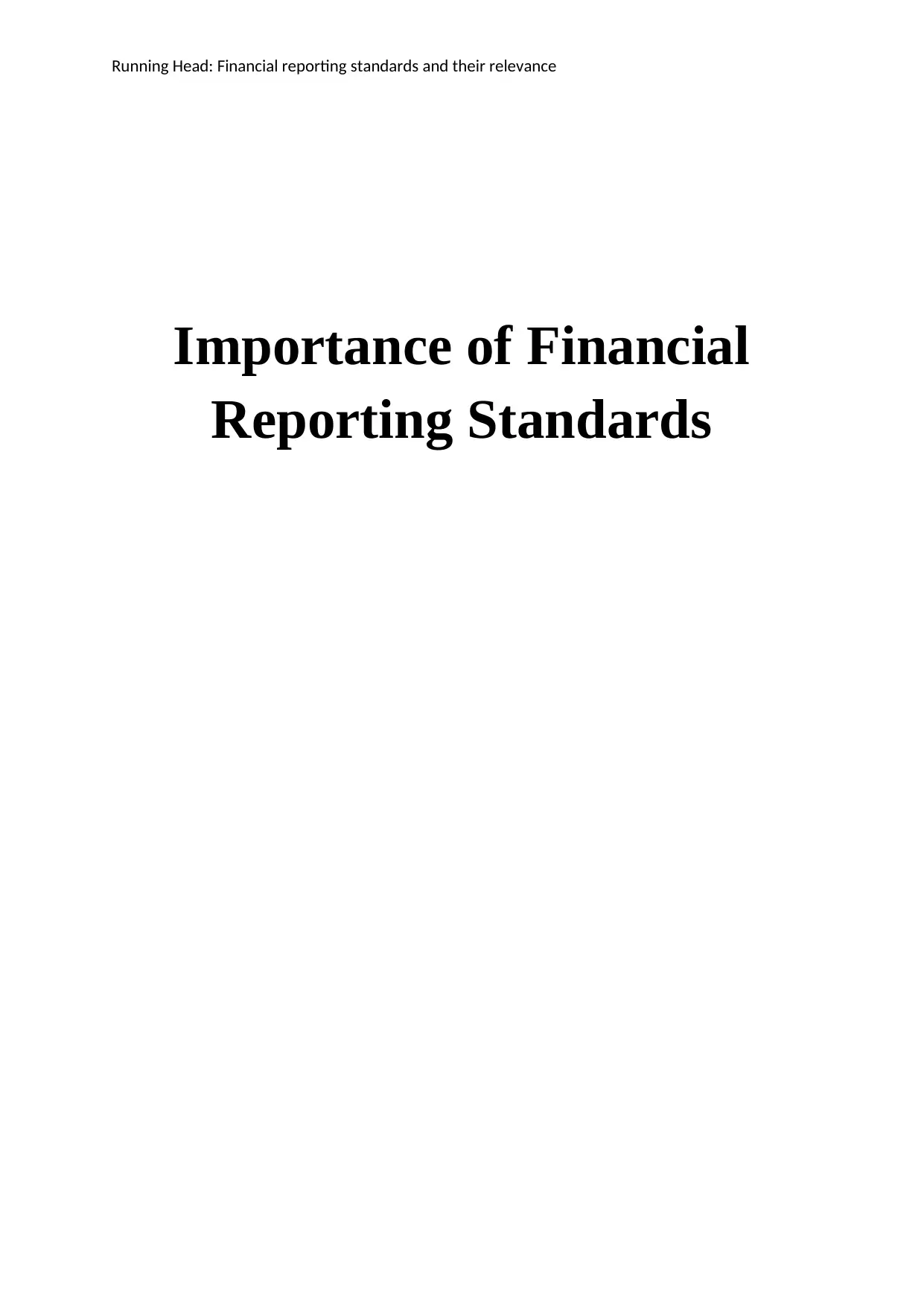
Running Head: Financial reporting standards and their relevance
Importance of Financial
Reporting Standards
Importance of Financial
Reporting Standards
Secure Best Marks with AI Grader
Need help grading? Try our AI Grader for instant feedback on your assignments.
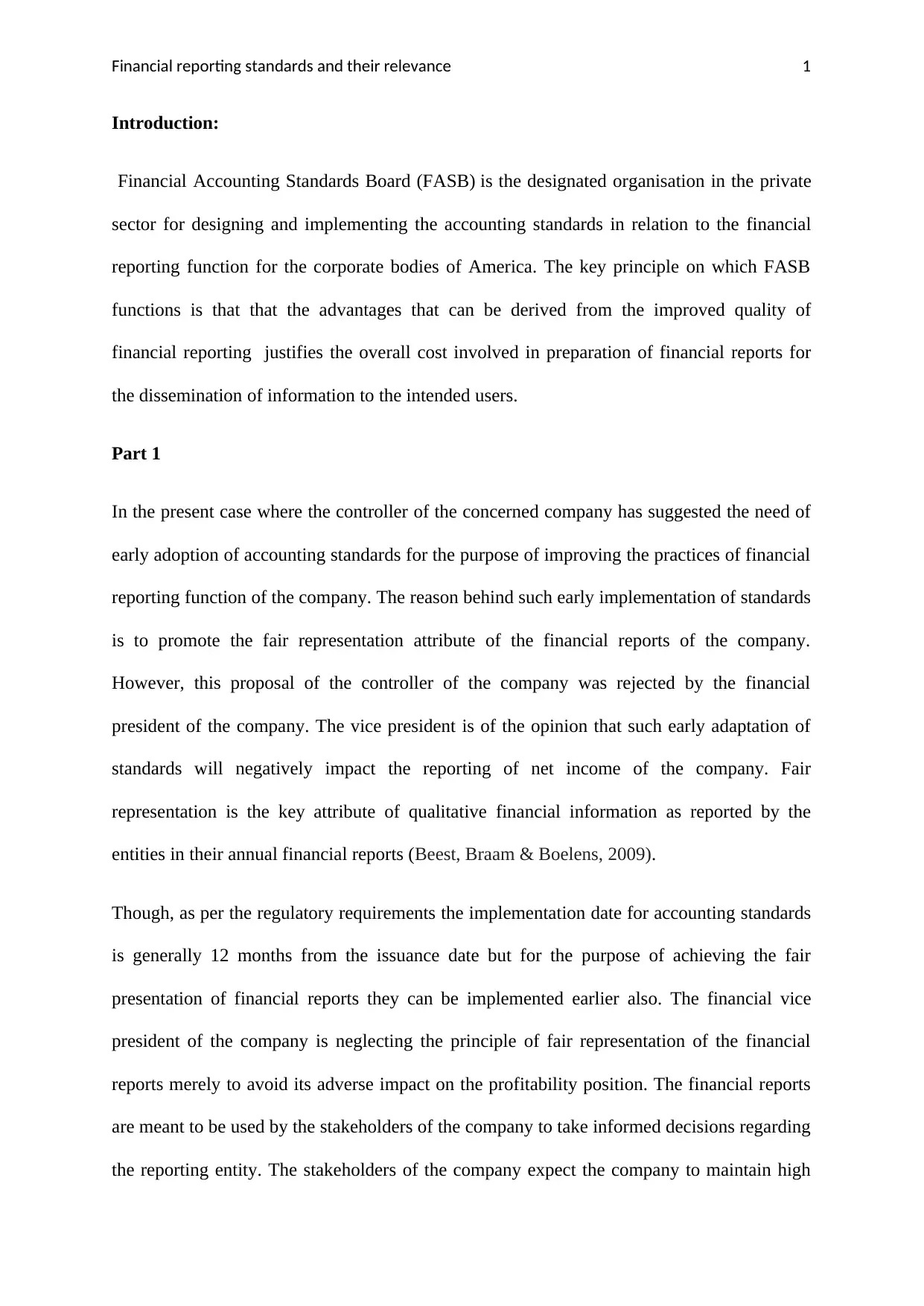
Financial reporting standards and their relevance 1
Introduction:
Financial Accounting Standards Board (FASB) is the designated organisation in the private
sector for designing and implementing the accounting standards in relation to the financial
reporting function for the corporate bodies of America. The key principle on which FASB
functions is that that the advantages that can be derived from the improved quality of
financial reporting justifies the overall cost involved in preparation of financial reports for
the dissemination of information to the intended users.
Part 1
In the present case where the controller of the concerned company has suggested the need of
early adoption of accounting standards for the purpose of improving the practices of financial
reporting function of the company. The reason behind such early implementation of standards
is to promote the fair representation attribute of the financial reports of the company.
However, this proposal of the controller of the company was rejected by the financial
president of the company. The vice president is of the opinion that such early adaptation of
standards will negatively impact the reporting of net income of the company. Fair
representation is the key attribute of qualitative financial information as reported by the
entities in their annual financial reports (Beest, Braam & Boelens, 2009).
Though, as per the regulatory requirements the implementation date for accounting standards
is generally 12 months from the issuance date but for the purpose of achieving the fair
presentation of financial reports they can be implemented earlier also. The financial vice
president of the company is neglecting the principle of fair representation of the financial
reports merely to avoid its adverse impact on the profitability position. The financial reports
are meant to be used by the stakeholders of the company to take informed decisions regarding
the reporting entity. The stakeholders of the company expect the company to maintain high
Introduction:
Financial Accounting Standards Board (FASB) is the designated organisation in the private
sector for designing and implementing the accounting standards in relation to the financial
reporting function for the corporate bodies of America. The key principle on which FASB
functions is that that the advantages that can be derived from the improved quality of
financial reporting justifies the overall cost involved in preparation of financial reports for
the dissemination of information to the intended users.
Part 1
In the present case where the controller of the concerned company has suggested the need of
early adoption of accounting standards for the purpose of improving the practices of financial
reporting function of the company. The reason behind such early implementation of standards
is to promote the fair representation attribute of the financial reports of the company.
However, this proposal of the controller of the company was rejected by the financial
president of the company. The vice president is of the opinion that such early adaptation of
standards will negatively impact the reporting of net income of the company. Fair
representation is the key attribute of qualitative financial information as reported by the
entities in their annual financial reports (Beest, Braam & Boelens, 2009).
Though, as per the regulatory requirements the implementation date for accounting standards
is generally 12 months from the issuance date but for the purpose of achieving the fair
presentation of financial reports they can be implemented earlier also. The financial vice
president of the company is neglecting the principle of fair representation of the financial
reports merely to avoid its adverse impact on the profitability position. The financial reports
are meant to be used by the stakeholders of the company to take informed decisions regarding
the reporting entity. The stakeholders of the company expect the company to maintain high
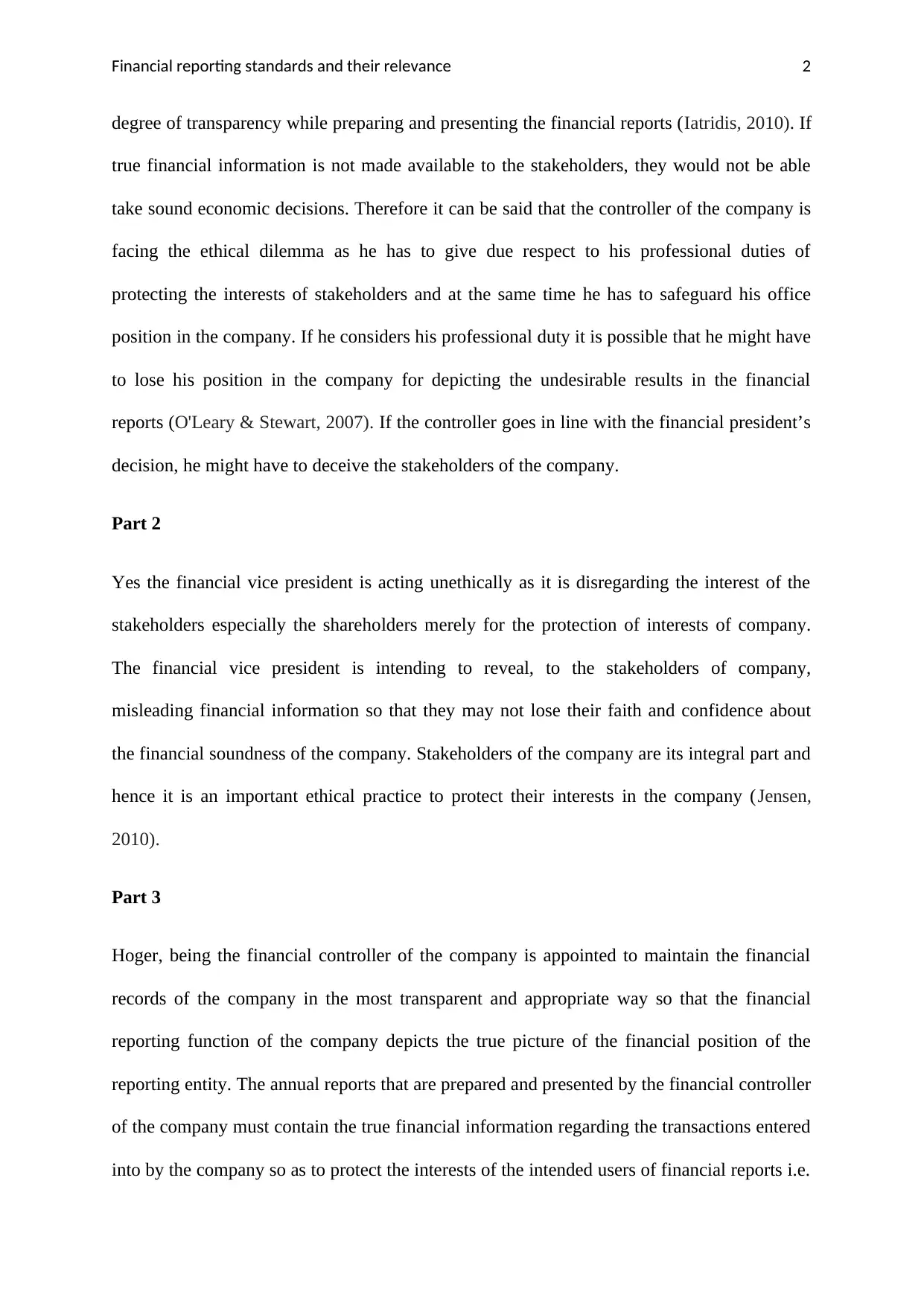
Financial reporting standards and their relevance 2
degree of transparency while preparing and presenting the financial reports (Iatridis, 2010). If
true financial information is not made available to the stakeholders, they would not be able
take sound economic decisions. Therefore it can be said that the controller of the company is
facing the ethical dilemma as he has to give due respect to his professional duties of
protecting the interests of stakeholders and at the same time he has to safeguard his office
position in the company. If he considers his professional duty it is possible that he might have
to lose his position in the company for depicting the undesirable results in the financial
reports (O'Leary & Stewart, 2007). If the controller goes in line with the financial president’s
decision, he might have to deceive the stakeholders of the company.
Part 2
Yes the financial vice president is acting unethically as it is disregarding the interest of the
stakeholders especially the shareholders merely for the protection of interests of company.
The financial vice president is intending to reveal, to the stakeholders of company,
misleading financial information so that they may not lose their faith and confidence about
the financial soundness of the company. Stakeholders of the company are its integral part and
hence it is an important ethical practice to protect their interests in the company (Jensen,
2010).
Part 3
Hoger, being the financial controller of the company is appointed to maintain the financial
records of the company in the most transparent and appropriate way so that the financial
reporting function of the company depicts the true picture of the financial position of the
reporting entity. The annual reports that are prepared and presented by the financial controller
of the company must contain the true financial information regarding the transactions entered
into by the company so as to protect the interests of the intended users of financial reports i.e.
degree of transparency while preparing and presenting the financial reports (Iatridis, 2010). If
true financial information is not made available to the stakeholders, they would not be able
take sound economic decisions. Therefore it can be said that the controller of the company is
facing the ethical dilemma as he has to give due respect to his professional duties of
protecting the interests of stakeholders and at the same time he has to safeguard his office
position in the company. If he considers his professional duty it is possible that he might have
to lose his position in the company for depicting the undesirable results in the financial
reports (O'Leary & Stewart, 2007). If the controller goes in line with the financial president’s
decision, he might have to deceive the stakeholders of the company.
Part 2
Yes the financial vice president is acting unethically as it is disregarding the interest of the
stakeholders especially the shareholders merely for the protection of interests of company.
The financial vice president is intending to reveal, to the stakeholders of company,
misleading financial information so that they may not lose their faith and confidence about
the financial soundness of the company. Stakeholders of the company are its integral part and
hence it is an important ethical practice to protect their interests in the company (Jensen,
2010).
Part 3
Hoger, being the financial controller of the company is appointed to maintain the financial
records of the company in the most transparent and appropriate way so that the financial
reporting function of the company depicts the true picture of the financial position of the
reporting entity. The annual reports that are prepared and presented by the financial controller
of the company must contain the true financial information regarding the transactions entered
into by the company so as to protect the interests of the intended users of financial reports i.e.
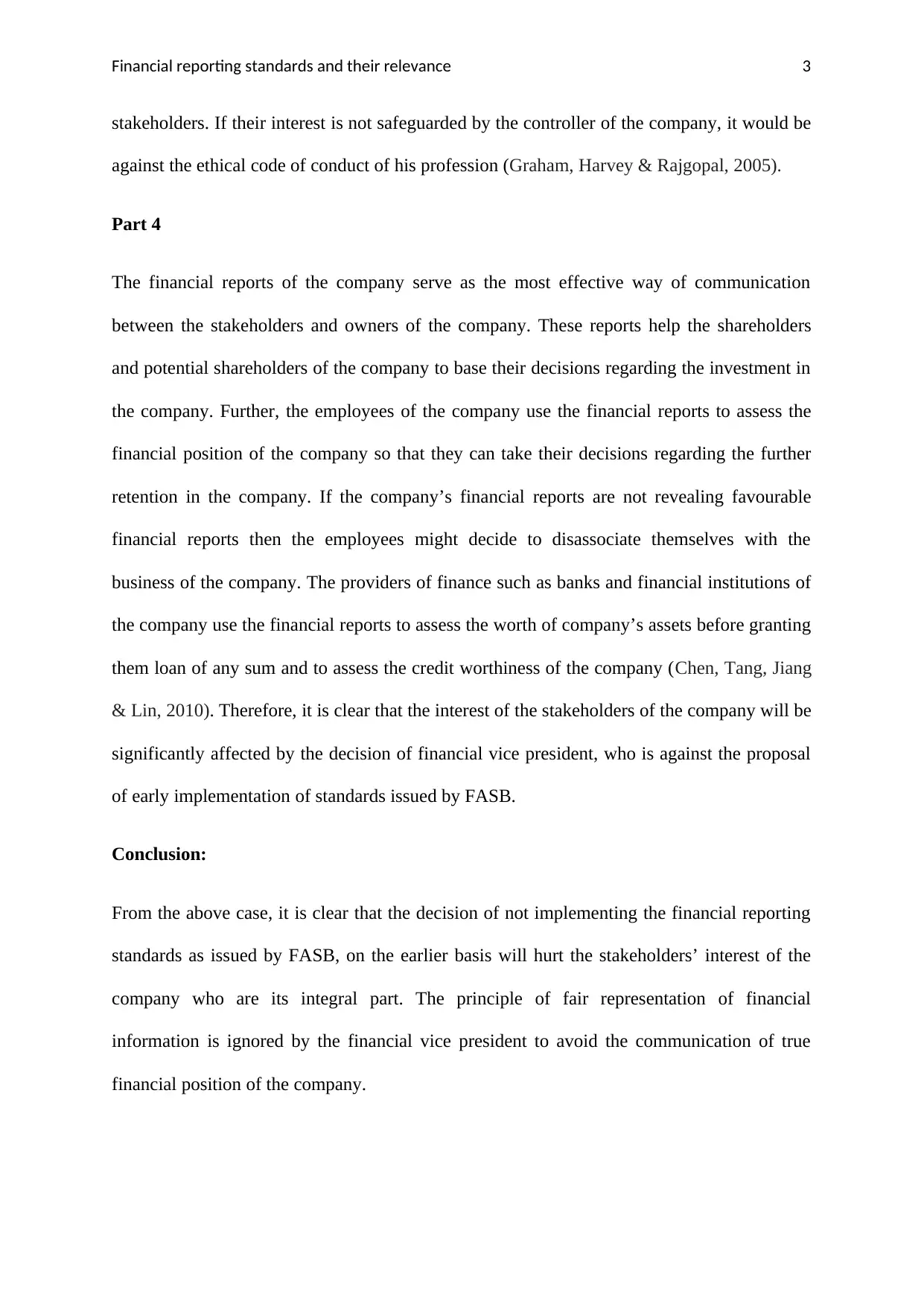
Financial reporting standards and their relevance 3
stakeholders. If their interest is not safeguarded by the controller of the company, it would be
against the ethical code of conduct of his profession (Graham, Harvey & Rajgopal, 2005).
Part 4
The financial reports of the company serve as the most effective way of communication
between the stakeholders and owners of the company. These reports help the shareholders
and potential shareholders of the company to base their decisions regarding the investment in
the company. Further, the employees of the company use the financial reports to assess the
financial position of the company so that they can take their decisions regarding the further
retention in the company. If the company’s financial reports are not revealing favourable
financial reports then the employees might decide to disassociate themselves with the
business of the company. The providers of finance such as banks and financial institutions of
the company use the financial reports to assess the worth of company’s assets before granting
them loan of any sum and to assess the credit worthiness of the company (Chen, Tang, Jiang
& Lin, 2010). Therefore, it is clear that the interest of the stakeholders of the company will be
significantly affected by the decision of financial vice president, who is against the proposal
of early implementation of standards issued by FASB.
Conclusion:
From the above case, it is clear that the decision of not implementing the financial reporting
standards as issued by FASB, on the earlier basis will hurt the stakeholders’ interest of the
company who are its integral part. The principle of fair representation of financial
information is ignored by the financial vice president to avoid the communication of true
financial position of the company.
stakeholders. If their interest is not safeguarded by the controller of the company, it would be
against the ethical code of conduct of his profession (Graham, Harvey & Rajgopal, 2005).
Part 4
The financial reports of the company serve as the most effective way of communication
between the stakeholders and owners of the company. These reports help the shareholders
and potential shareholders of the company to base their decisions regarding the investment in
the company. Further, the employees of the company use the financial reports to assess the
financial position of the company so that they can take their decisions regarding the further
retention in the company. If the company’s financial reports are not revealing favourable
financial reports then the employees might decide to disassociate themselves with the
business of the company. The providers of finance such as banks and financial institutions of
the company use the financial reports to assess the worth of company’s assets before granting
them loan of any sum and to assess the credit worthiness of the company (Chen, Tang, Jiang
& Lin, 2010). Therefore, it is clear that the interest of the stakeholders of the company will be
significantly affected by the decision of financial vice president, who is against the proposal
of early implementation of standards issued by FASB.
Conclusion:
From the above case, it is clear that the decision of not implementing the financial reporting
standards as issued by FASB, on the earlier basis will hurt the stakeholders’ interest of the
company who are its integral part. The principle of fair representation of financial
information is ignored by the financial vice president to avoid the communication of true
financial position of the company.
Secure Best Marks with AI Grader
Need help grading? Try our AI Grader for instant feedback on your assignments.
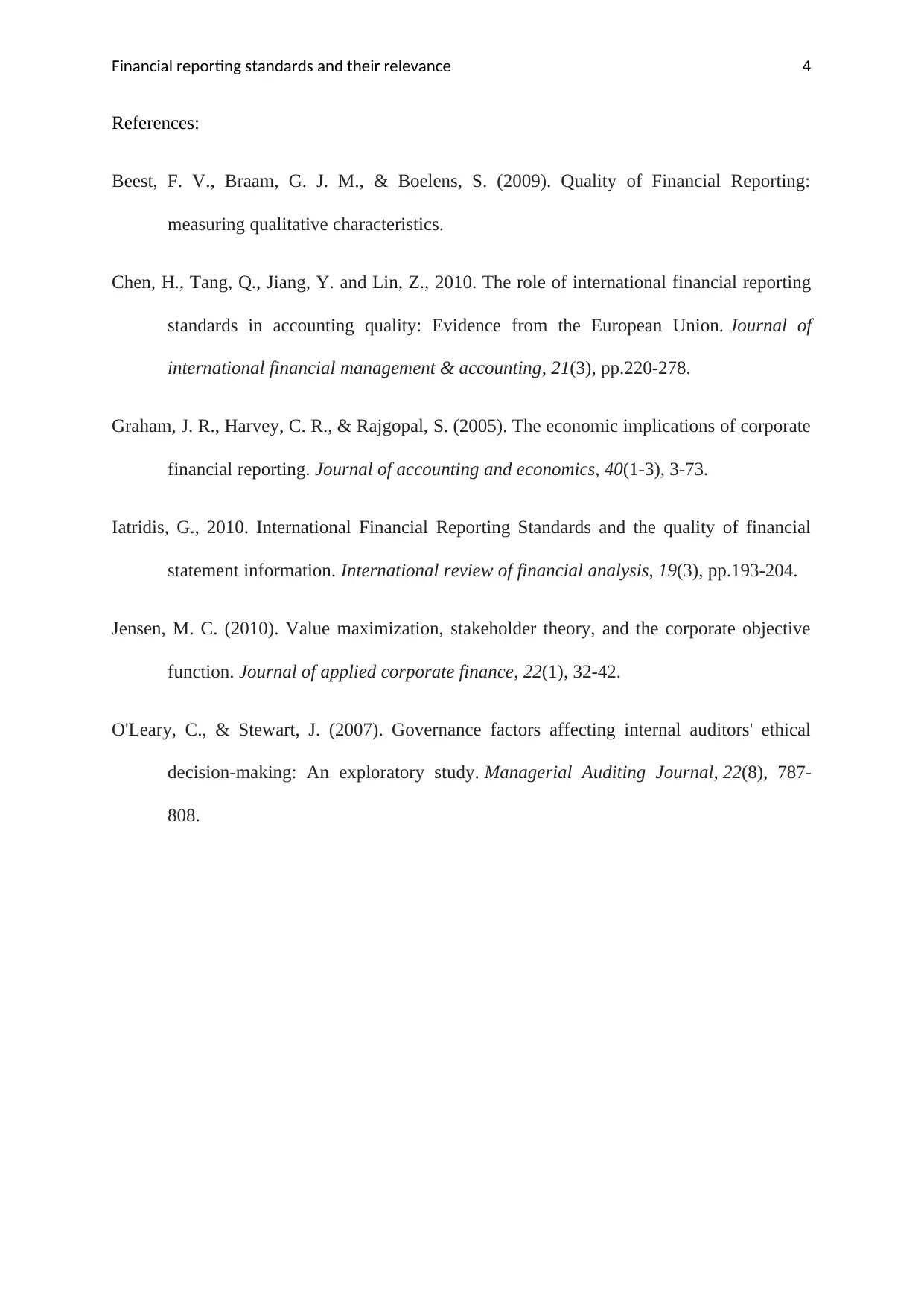
Financial reporting standards and their relevance 4
References:
Beest, F. V., Braam, G. J. M., & Boelens, S. (2009). Quality of Financial Reporting:
measuring qualitative characteristics.
Chen, H., Tang, Q., Jiang, Y. and Lin, Z., 2010. The role of international financial reporting
standards in accounting quality: Evidence from the European Union. Journal of
international financial management & accounting, 21(3), pp.220-278.
Graham, J. R., Harvey, C. R., & Rajgopal, S. (2005). The economic implications of corporate
financial reporting. Journal of accounting and economics, 40(1-3), 3-73.
Iatridis, G., 2010. International Financial Reporting Standards and the quality of financial
statement information. International review of financial analysis, 19(3), pp.193-204.
Jensen, M. C. (2010). Value maximization, stakeholder theory, and the corporate objective
function. Journal of applied corporate finance, 22(1), 32-42.
O'Leary, C., & Stewart, J. (2007). Governance factors affecting internal auditors' ethical
decision-making: An exploratory study. Managerial Auditing Journal, 22(8), 787-
808.
References:
Beest, F. V., Braam, G. J. M., & Boelens, S. (2009). Quality of Financial Reporting:
measuring qualitative characteristics.
Chen, H., Tang, Q., Jiang, Y. and Lin, Z., 2010. The role of international financial reporting
standards in accounting quality: Evidence from the European Union. Journal of
international financial management & accounting, 21(3), pp.220-278.
Graham, J. R., Harvey, C. R., & Rajgopal, S. (2005). The economic implications of corporate
financial reporting. Journal of accounting and economics, 40(1-3), 3-73.
Iatridis, G., 2010. International Financial Reporting Standards and the quality of financial
statement information. International review of financial analysis, 19(3), pp.193-204.
Jensen, M. C. (2010). Value maximization, stakeholder theory, and the corporate objective
function. Journal of applied corporate finance, 22(1), 32-42.
O'Leary, C., & Stewart, J. (2007). Governance factors affecting internal auditors' ethical
decision-making: An exploratory study. Managerial Auditing Journal, 22(8), 787-
808.
1 out of 5
Related Documents
Your All-in-One AI-Powered Toolkit for Academic Success.
+13062052269
info@desklib.com
Available 24*7 on WhatsApp / Email
![[object Object]](/_next/static/media/star-bottom.7253800d.svg)
Unlock your academic potential
© 2024 | Zucol Services PVT LTD | All rights reserved.




